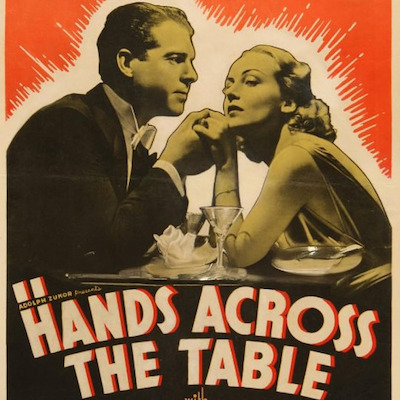If proof were needed of Carole Lombard's acting talent, it's a single shot early in Hands Across the Table, the 1935 screwball made as a star vehicle for Lombard by Paramount. She plays Regi Allen, a manicurist working at a Manhattan luxury hotel (the "Savoy-Carleton", a name that hits two high-end hostelries with one stone), and we're introduced to her exiting a crammed subway train at Grand Central station with her ditzy, numerology-obsessed co-worker Nona (Marie Prevost).
She's a working girl aiming to pull herself out of her poor upbringing by marrying rich and has decided that buffing the nails of millionaire guests is her best chance. Her first client in the film is Allan Macklyn (Ralph Bellamy), rich enough to occupy a penthouse suite with his butler but confined to a wheelchair after a flying accident. He's rich and single but clearly at a low point; wearing an old dressing gown, parked at a desk covered in old newspapers, but the sight of Regi immediately cheers him up.
The camera is close in on Lombard's face when she sees him for the first time, and her expressions flash from surprise to disappointment to pity to empathy, resolving into a welcoming smile. We have enough insight into Regi's character to sympathize with her in spite of the rather mercenary emotional game she's trying to play; we also know what Allan won't know for most of the rest of the picture: that he's been (to use a term definitely not in play in 1935) friend-zoned.
Allan becomes a regular client, and he starts turning around – wearing better dressing gowns and allowing himself to become her confidante. After one of their appointments she encounters a man playing hopscotch in the hotel hallway. She takes him for a kook, unaware that he's Theodore "Ted" Drew III (Fred MacMurray); the Drews are big names in the social register and her boss does her a favour by booking her when he calls for an appointment in the hotel spa.
After the usual mix-up – she sees the hopscotch playing kook and tries to fob him off on Nona before being set straight – Regi nervously mauls Ted's nails, but despite the torture he invites her out for a night on the town. On the way home from work she empties her bank account on her hair and a new outfit; it's important before anything else happens that we know that Regi has very poor instincts.
During the inebriated cab ride home Ted admits that he's engaged before passing out, but she takes pity on him and hauls him upstairs to sleep it off on her settee, where he's still passed out when she heads off to work at the hotel the next morning. She arrives home to find him still there, attempting to press his trousers and apparently stranded for lack of money for subway fare.

It turns out that Ted and Regi have a lot in common; since the Drew fortune disappeared with the Crash he's become reliant on the charity of others, and in particular Vivian Snowden (Astrid Allwyn), the daughter of the "Pineapple King", who likes the idea of marrying into a society family like the Drews. He was supposed to be on a boat to Bermuda that morning, paid for by his future father-in-law to keep him out of the way until the wedding.
They bond over their shared ambition – "heels" who want to marry for money – and with nowhere to stay until he's supposed to be back from the trip he spends a week on her settee. At this point we know where this is all going and like any good audience for a screwball comedy we watch and wait for our protagonists to arrive at their inevitable destiny.
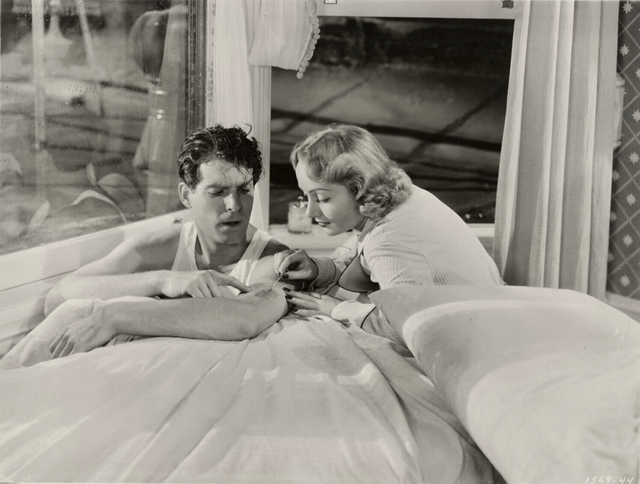
Carole Lombard was an old hand in Hollywood by 1935; she'd been appearing onscreen since 1921 but her career bubbled under in the pre-Code era, making up to five films a year with only rare highlights like No Man of Her Own in 1932. She had a hit with We're Not Dressing and a flop with Twentieth Century and finally won both critics and audiences over with Lady by Choice in 1934.
Paramount decided she was worth investing in and built Hands Across the Table around her, with no less than Ernst Lubitsch working as an uncredited producer to develop the project. With a screenplay by Norman Krasna (Fury, Mr. & Mrs. Smith, The Devil and Miss Jones, White Christmas) based on a story by Viña Delmar (Make Way for Tomorrow, The Awful Truth), the film was supposed to do for Lombard what It Happened One Night did for Claudette Colbert.
Lombard wanted Cary Grant to play Ted but he was unavailable and MacMurray, hardly known for his comic talent, was given the part. Lombard and director Mitchell Leisen (Easy Living, Midnight, Remember the Night) worked hard to bring out MacMurray's comic potential; at one point Lombard sat on the actor's chest, pounding him with her fists and wailing "Now Uncle Fred you be funny or I'll pluck your eyebrows out"!
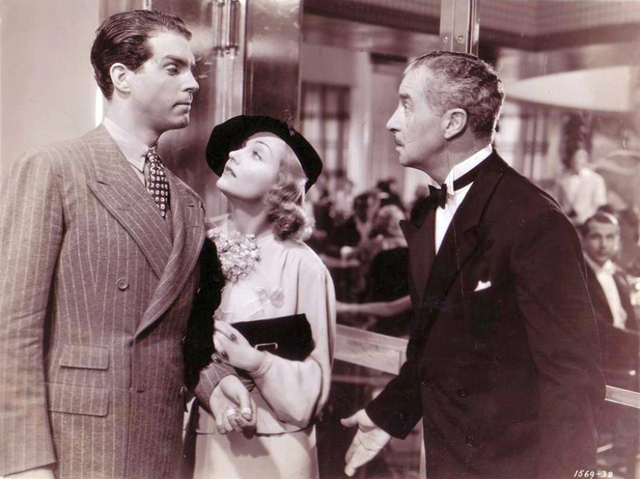
There must have been a playbook for this process as MacMurray comes off as a gawky oddball like young Jimmy Stewart, whose own career wouldn't really kick off for another year or two. The effort paid off with scenes like one where Ted is pretending to call his fiancée from Bermuda while Regi keeps breaking in, pretending to be the long-distance operator; the actors look genuinely amused by each other and end up rolling around on the floor together. In any case Lombard and MacMurray would end up starring together in three more films (The Princess Comes Across, Swing High, Swing Low and True Confession).
Hands Across the Table is the first film where Lombard looks at home in her onscreen persona; her performance is full of endearing little touches, like when she follows Allan's butler into his suite, her nose in the air as if mocking him and the deference the situation demands. In The Runaway Bride: Hollywood Romantic Comedy of the 1930s, Elizabeth Kendall writes that it was "her most aesthetic romantic comedy to date" and that Leisen and cinematographer Ted Tetzlaff "got the camera up close to her face again and again, and they made lustrous use of her light eyes in moments of yearning."
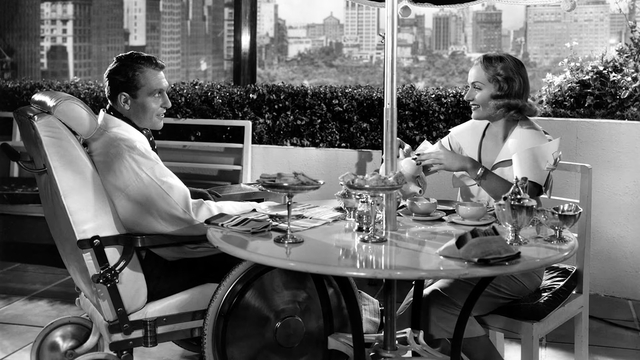
If anything puts Hands Across the Table squarely in the screwball genre – canonical, even – it's Ralph Bellamy as the third wheel, the nice guy who spends the film waiting to be dumped by the heroine. It's a role he famously played in The Awful Truth and His Girl Friday, so his Allan in Hands Across the Table qualifies as the prototype. Bellamy would play yet another variation on the role opposite Lombard in the 1938 flop Fools for Scandal.
It seems unnecessarily cruel that Bellamy's Allan – both a perfect and willing target for Regi's gold-digging – should be a wheelchair-bound paraplegic. They get several scenes together that twist the knife when, at the end, Regi finally sets her cap on Ted. Even Allan's butler is shocked and disappointed, which allows anyone in the audience dismayed by Regi's choice an onscreen surrogate for their reaction.
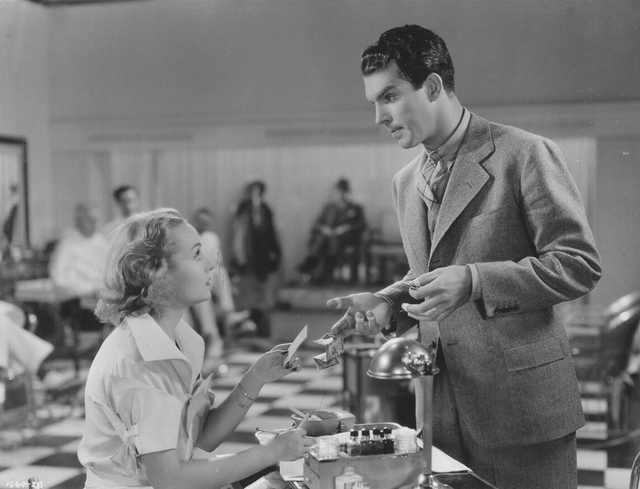
As an aside the premise of the film, baked right into its title, is a social phenomenon that was obviously so accepted that it needed no explanation: the popularity (at least among the affluent) of male manicures. In their sole scene together Vivian wonders why men of her class are prone to falling for their manicurists; does it have something to do with the intimacy of holding hands while they work?
Statistics are hard to find but the male manicure was apparently a fact even in the middle of the Great Depression, and to an extent that I can't recall at any point in my own lifetime. I've never had one, and while that may have something to do with being raised working class and being broke for much of my life, my experience is that male grooming has been a largely private matter for several generations, and that even a straight razor barber shave was considered an indulgence for most men – something they'd only see in a period film.
Occasional swells in male peacocking, as in the late '60s and early '70s, apparently saw a surge in the male manicure alongside the gent's hair salon (and during the long, slow decline of barber shops). And there are stories about a recent rise in male nail care inspired by male style icons like Harry Styles and encouraged (or excused?) by concerns about nail hygiene. But it's still a fringe trend that makes the hotel salon where Regi works make Hands Across the Table come across as a vignette of a past where they did things very differently.
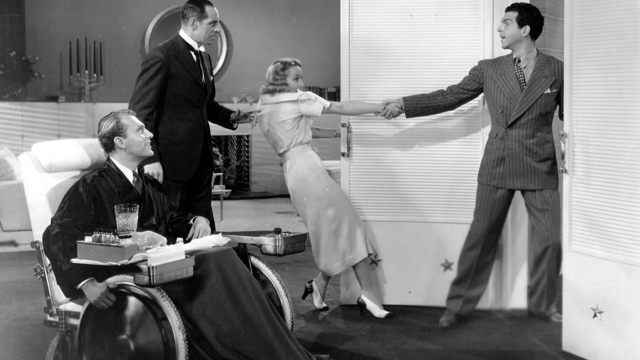
That Regi and Ted are drawn together at the end of the film is inevitable; she'd been reduced to tears after his drunken admission about his engagement, and their weeklong idyll of chaste cohabitation steers everything in that direction, especially as it comprises much of the film's concise eighty-minute runtime. But it's still altogether plausible that an alternate ending where Allan gets his chance to propose to Regi and Ted succumbs to the social convenience of his "arrangement" with Vivian wouldn't have been a catastrophe for either of our protagonists.
But that would have been morally awkward in a film made in the first flush of the Motion Picture Code. Which is why we get a madcap ending where Ted and Regi are on the top of a Fifth Avenue bus flipping a coin to decide whether to get married or have lunch, with Ted saying that if it lands on its side he'll look for work. When the coin falls to the pavement they stop the bus and cause a traffic jam looking to see where it landed, only to find it wedged on its side by a manhole cover. In the end, idle loafer Ted will be redeemed not just by love but by a job.
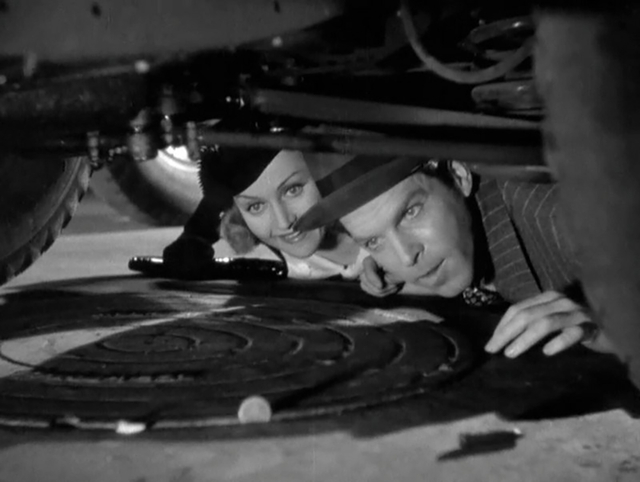
Hands Across the Table is a fine screwball but far from a great one, largely because it hasn't quite figured out what made Lombard such a perfect and enduring screwball heroine.
"It's "a screwball comedy without the joke – or the risk," writes James Harvey in Romantic Comedy in Hollywood from Lubitsch to Sturges. "Regi and Ted are wonderfulness on a rampage, without threat, mockery, or doubts. This is exactly how a lot of filmmakers understood screwball comedy (which they now began turning out in great numbers): as another kind of (Frank) Capra film. But without that cutting competitive edge between the couple – without the recklessness of the hitchhiking scene in It Happened One Night, the hints of danger and chagrin that glint beneath the surface of Nick and Nora's banter, the skepticism that finally resolves itself when Astaire and Rogers dance – the screwball couple, with all their public high jinks, seem offensively complacent rather than daring or adventurous."
"No one at Paramount understood yet," writes Elizabeth Kendall in Runaway Bride, "that Lombard needed a role created with her own qualities in mind – the hit of privilege gone awry, the eager innocence turned absurd." Which is why it would take another year and the release of My Man Godfrey for Carole Lombard to finally realize her onscreen persona, and just in the nick of time.
Club members can let Rick know what they think by logging in and sharing in the comments below, as access to the comments section is one of many benefits that comes along with membership in the Mark Steyn Club.


